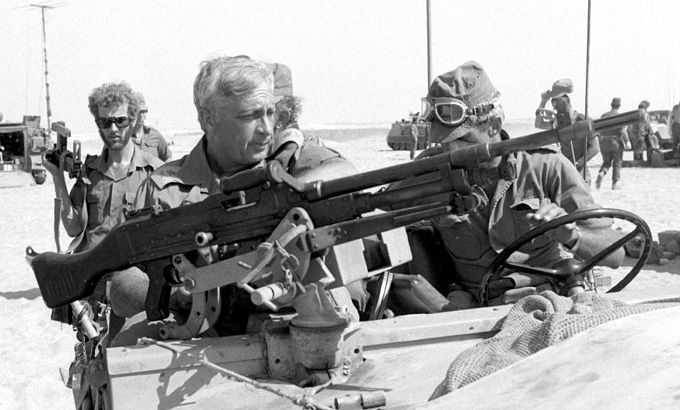
Ariel Sharon: Warrior or war criminal?
We discuss the complex legacy of Israel’s controversial former statesman and army commander.
Former Israeli Prime Minister Ariel Sharon is being remembered, both by those who loved and loathed him. The soldier-turned-statesman died on Saturday, aged 85.
He had been in a coma since suffering a stroke in 2006 when he was at the peak of his political career. He was an iconic figure for some, but a controversial one for others – a man simultaneously hailed as a war hero and derided as a ‘butcher’.
A full state funeral was planned for Sharon, who became known as ‘the bulldozer’ for his uncompromising attitude towards Palestinian diplomacy.
The difference between him and other right wing leaders is that he wouldn't hesitate in pursuing massacres or war crimes in order to achieve political objectives; he might be a soldier but that doesn't tell a lot because there are good soldiers and there are bad soldiers and I think Sharon was a bad soldier in the moral sense.
Thousands of Israeli citizens have been paying their last respects, as Sharon’s body lay in state outside the Israeli parliament in Jerusalem.
His life was closely intertwined with the country’s history, reflecting the complex link between security, peace and politics. But it was punctuated by both stunning victories, and disastrous mistakes.
Sharon fought in most of Israel’s wars, first gaining notoriety in the 1967 Six Day War that saw Israel attack Egypt, Jordan and Syria.
During the 1973 Yom Kippur War, he earned the nickname ‘The Lion of God’. As defence minister during the Lebanon War he was held indirectly responsible for the 1983 massacre of Palestinians at the Sabra and Shatila refugee camps, earning him a different title: The ‘Butcher of Beirut’.
A controversial visit to the grounds of the Al Aqsa mosque in Jerusalem in 2000 led to the second Palestinian uprising. It increased his popularity in Israel and, within months, he became prime minister.
Sharon was an early proponent of building settlements on occupied land, but in 2005, he appeared to have a change of heart, ordering all settlers and troops out of the Gaza Strip.
It has raised the question about what the greater significance of that gesture may have been, had he remained in office. He had reached the height of his career, and looked certain to win a landslide victory with his new Kadima party when he suffered a massive stroke in 2006 that put him in a coma.
Leading the tributes, Israeli Prime Minister Benjamin Netanyahu said: “I believe that his [Sharon’s] memory as one of the most outstanding leaders and daring commanders will remain in the hearts of the Israeli people for eternity.”
In contrast to the Palestinian view. Hamas official Moshir al-Masry, said: “Sharon has become history. We see him as a distinguished war criminal as he himself slaughtered a large number of Palestinians, especially the massacre in Palestinian refugee camps which took place in Lebanon in 1982.”
So, how would Ariel Sharon have shaped current events, had he stayed in office? And what effect would he have had on the Israeli-Palestinian conflict?
To discuss this, Inside Story presenter Stephen Cole is joined by guests: Yoaz Hendel, the head of the Institute for Zionist Strategies, and former director of communications for Prime Minister Benjamin Netanyahu; Ghassan Khatib, a professor at Bir Zeit University, and a former Palestinian minister; and Ian Black, the Middle East editor for the Guardian newspaper.
|
“What he did in the Gaza Strip was a very pragmatic solution to a situation where you have a minority of Jews in an area where you have many, many Palestinians …. We can never know but I think Sharon was … if you can determine it in one word … Sharon was the most pragmatic Israeli and the most Zionistic Israeli. He believed in the Zionistic idea and he believed that if you want to survive and to maintain and strengthen Israel, you need to be pragmatic in this neighbourhood.” Yoaz Hendel, the head of the Institute for Zionist Strategies |